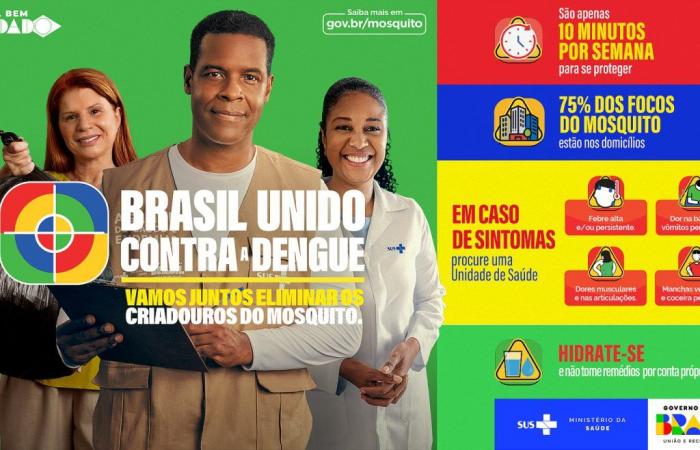
Brazil has already surpassed two million cases of dengue in 2024. Faced with this scenario, the Federal Government, states, municipalities and the Brazilian population are joining forces to reinforce the prevention and elimination of mosquito outbreaks.
To talk about dengue and other diseases transmitted by Aedes aegypti, we will listen to the director of the Department of Communicable Diseases of the Ministry of Health, Alda Maria da Cruz. She will also talk about how you can be part of this national mobilization and keep dengue far from home.
Hello, Doctor Alda. What is the dengue situation in Brazil?
“We are experiencing the largest epidemic in the country’s history, which began earlier than expected for that period and evolved very abruptly. There is a tendency towards stabilization and our expectation is that we will go through a period of decreasing cases. But we have different epidemiological situations in the country. Therefore, we need to look at each region carefully to carry out this analysis. We have a change in the planet’s climate that directly influences the mosquito’s biology, making it much more transmissible and effective in its ability to replicate in the environment.”
Dengue, zika and chikungunya. Three arboviruses transmitted by the Aedes aegypti mosquito. Despite this, they are different viruses. What causes us to confuse the three are the symptoms, which are all very similar.
Doctor Alda, what are these symptoms?
“Fever, body pain, joint pain, tiredness, spots on the body. These are diseases that can lead to death. So, there is the risk and what differentiates them is the subsequent evolution.”
Dr. Alda, if any of these symptoms appear, what should a person do?
“Normally, we say: ‘It’s just a fever, I’ll get better. Tomorrow, I’ll get better. I’m going to sleep and tomorrow I’ll be fine’. No. Look for a health unit, because the evolution is very fast. Between 5 and 6 days, the patient may die. If we intervene early, we can avoid this [morte].”
The motto of this year’s mosquito control campaign is that with just 10 minutes a week, it is possible to keep dengue fever far from home. Can you list the precautions to be taken in those 10 minutes?
“Pay attention to any location that may have an accumulation of water – even the most unlikely ones. We always talk about bottles, tires, gutters, water tanks. But let’s also look at the container behind the refrigerator that collects water, that water inside the air conditioner, inside the bromeliad, from the plants. So, any place that has the possibility of having stagnant water is an effective breeding ground for mosquitoes.”
There is no medicine for dengue fever, only medicines that alleviate the symptoms and discomfort caused by the disease. Therefore, when the first symptoms appear, the advice is to seek a health unit and seek medical care. Doctor Alda, what type of measures do we need to avoid in case of suspected dengue fever?
“Take no medicine. Beware of miracle solutions and fake news about products recommended against the disease. Medicines based on acetylsalicylic acid increase the possibility of bleeding – which is one of the risks of dengue. Those infected should also avoid anti-inflammatories. For fever, the patient can take antipyretics, but they should check first if they do not contain these components.”
Scientifically proven and tested, the dengue vaccine available in the SUS is safe and prevents cases from worsening. Director, how important is this additional ally in the fight against the disease?
“The age group we chose – between 10 and 14 years old – is the one in which we identified the highest number of hospitalizations. So, if you don’t want your child to get dengue, go to the hospital and have it develop into a serious form, please look for a health unit – in the 10 to 14 year age range – so they can get immunized and protect themselves from this disease that leads to death – and many have already been recorded in this age group.”
Very good. We just listened to Alda Maria da Cruz, director of the Department of Communicable Diseases at the Ministry of Health. She answered our questions about dengue and showed us how to combat the mosquito that transmits the disease, Aedes aegypti, inside our homes.
And don’t forget: it’s just 10 minutes a week to protect your family and neighbors from dengue.
Fight against mosquitoes. To do things differently, we need to act first.
Ministry of Health. Brazil, Union and Reconstruction. Federal government.
Tags: QUESTIONS experiencing largest Dengue epidemic countrys history director Department Communicable Diseases Ministry Health
--




